This article is more than 5 years old.
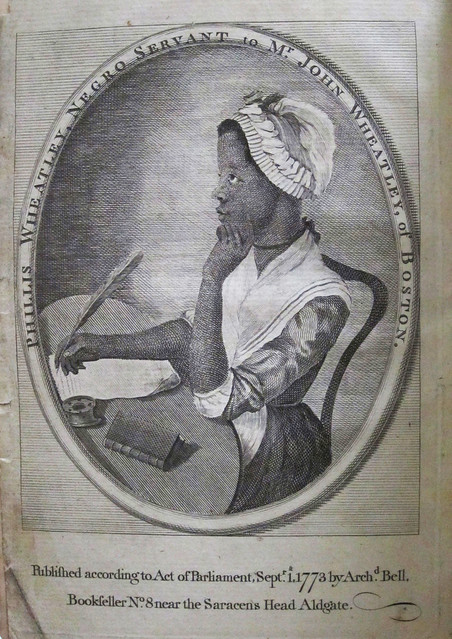
Poems on Various Subjects, Religious and Moral is the first published volume of poetry by an African American author. This fact in itself would make the book significant, but Phillis Wheatley’s Poems has a complicated and fascinating history of its own.
Readers of the 1773 first edition would have been familiar with biographical details of Wheatley’s life. Born around 1754, the future poet was kidnapped from some part of Africa and transported to Boston aboard the slave ship Phillis in 1761. A frail child of not more than seven, she miraculously survived a transatlantic journey that killed nearly a quarter of her fellow-passengers (a figure slightly higher than average for slave ships of that time).
Most of the Phillis’s human cargo was sold in the Caribbean. Only those unfit for work on the plantations—women, children, the elderly, sick, or disabled—continued on to Boston to be sold as domestic servants. Slavery was legal in all of the British colonies in the mid-18th century, but African slaves were fairly uncommon in New England.
John Wheatley, a prosperous Boston merchant and devout Congregationalist, purchased the little girl as a companion for his wife, Susanna. She was named after the ship that brought her from Africa. Once in the Wheatley home, Phillis quickly displayed an aptitude for learning. Her education, likely undertaken by Susanna Wheatley and her 18-year-old daughter, Mary, was equivalent to that of the daughters of any well-off New England family of the time. A prefatory note to the Poems describes Phillis’s early life and education:
Phillis Wheatley’s experience as a slave in 18th century Boston was highly unusual, in that she does appear to have been treated by Susanna Wheatley as a member of the family, or something close to it. Phillis herself wrote after Susanna’s death that “I was treated by her more like her child than her Servant; no opportunity was left unimprov’d, of giving me the best of advice…”.
Phillis Wheatley became a published author at the age of about 13, when her poem “On Messrs. Hussey and Coffin” was printed in the Newport Mercury newspaper. In 1770 her elegy for the charismatic Rev. George Whitefield was widely printed as a broadside.
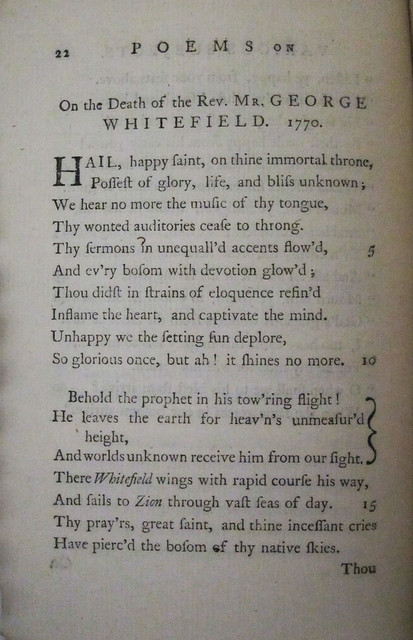
By 1772 Phillis had apparently amassed a considerable number of poems in manuscript, which had been widely circulated among the Wheatleys’ circle. Susanna (presumably with Phillis’s approval) decided to seek a wider audience by having a collection of 28 poems published. She advertised the Boston Censor magazine for subscribers for “A Collection of Poems, wrote at several times, and upon various occasions, by PHILLIS, a Negro Girl, from the strength of her own Genius.” The volume was to be an octavo of approximately 200 pages “handsomely bound and lettered.” The publisher, Ezekiel Russell, would begin printing copies as soon as 300 subscribers were committed to purchasing the book.
Publishing by subscription was a standard practice for an unknown author in the 18th century, especially in the colonies. Boston printers made their living from steady sellers like primers, almanacs, newspapers, and pamphlets. Then as now, a book of poetry was unlikely to turn much of a profit, so an aspiring author would be required to finance the publication herself.
Colonial printing in general was a very small enterprise compared to the large and established publishing industry in London. So it is not surprising that the majority of books for sale in the North American colonies were imported from England, nor that many American authors sought London publishers for their works. Even as Phillis waited for subscribers to sign up for her proposed Boston publication, she and the rest of the Wheatleys were using their connections to make inquiries in England.
Phillis had sent a copy of her elegy for George Whitefield to Selina Hastings, the Countess of Huntingdon, whom Whitefield had served as personal chaplain. The Countess was involved in many of the same evangelical causes as were the Wheatleys, and in 1772 she agreed to finance the publication of Phillis’s poems by London printer Archibald Bell. Since subscribers for the Boston venture were not very forthcoming, and since publication in London was far more prestigious anyway, the Wheatleys quickly agreed.
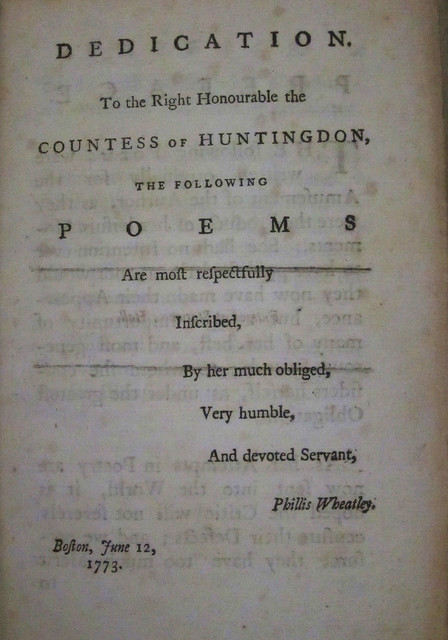
At the suggestion of the Countess of Huntingdon, the Wheatleys provided an engraved portrait of Phillis for the book’s frontispiece. The portrait may have been done by another African slave living in Boston, the artist Scipio Moorhead. Phillis included a poem to him in the published collection.
The portrait was a somewhat surprising addition to the volume, such frontispieces being common only in substantial tomes by famous (and often long-dead) authors. But the Countess told the Wheatleys’ agent that it would “contribute greatly to the Sale of the Book”. She likely assumed that the portrait would reinforce the novelty of a young, enslaved, African woman writing a book of poetry.
The marketing of the London volume focused almost entirely on this seeming incongruity. Anticipating that there might be skepticism about whether Phillis was actually the author of the poems, she and the Wheatleys recruited eighteen of New England’s most prominent religious and political leaders to sign a document attesting to the veracity of her authorship.
Phillis herself was well aware that her published volume of poetry was not just a reflection of her personal abilities. For Phillis, the rest of the Wheatleys, and their like-minded supporters, Poems on Various Subjects was a political and moral statement intended to incite controversy.
Debate about the moral and intellectual capacities of people of African descent was raging in the 18th century public sphere, and the abolitionist movement was beginning to organize itself in England. The nation had invented, and was still the major participant in, the trans-Atlantic slave trade. But the horrors of the slave trade and the appalling conditions on Caribbean plantations in particular had begun to turn English public opinion against the institution of slavery.
Supporters of the system of chattel slavery argued that these early abolitionists were naïve about the nature of enslaved Africans. Branches of 18th century science put forth the idea that the African races had evolved separately from the European and were essentially subhuman, incapable of true moral sensibility or artistic creativity. Therefore their use as slave labor was no more immoral than the keeping of domesticated animals. Opponents of this view put forth both religious and scientific arguments to counter it. Of course, there were many gradations on this spectrum of belief. Many people who were convinced of the overall inferiority of Africans (Thomas Jefferson, for example) still strongly objected to the inhumane treatment of slaves. And some, like John and Susanna Wheatley, who argued for the inherent equality of the races, nonetheless owned slaves themselves. But the argument itself was basic to the debate over whether slavery could exist in a civilized society.
As the publication of Phillis’s poems was being arranged, it was decided that she should make what was essentially a publicity tour to England. John and Susanna Wheatley’s son Nathaniel had planned a business trip to London in the spring of 1773, and Phillis accompanied him. Publicity for the book was meticulously planned by Susanna, Phillis, and their friends. Phillis’s poem “A Farewel to America” was published in New England papers upon her departure and was also sent ahead to London for publication there.
In the poem Phillis expresses regret at parting with Susanna (who was quite ill), but also eagerly anticipates her visit to the intellectual and cultural center of British society. The visit of an enslaved person to England at this point in time had other implications, which would have been well known to readers on both sides of the Atlantic. The Somerset Decision had recently ruled that enslaved Africans visiting England could not be forced by their purported masters to return to the Americas. If Phillis had chosen to stay in England in the summer of 1773, Nathaniel could not have compelled her return to Boston.
And it appears that Phillis thoroughly enjoyed her time in London. Although she did not meet her patron the Countess of Huntingdon (who was in Wales at the time), she visited many well-known figures and was toured around the cultural high points of London. Her visit was cut short, however, by news of Susanna Wheatley’s rapidly failing health. Phillis chose to return to Boston to be with Susanna during her last days, leaving London a month before her volume of poetry was published.
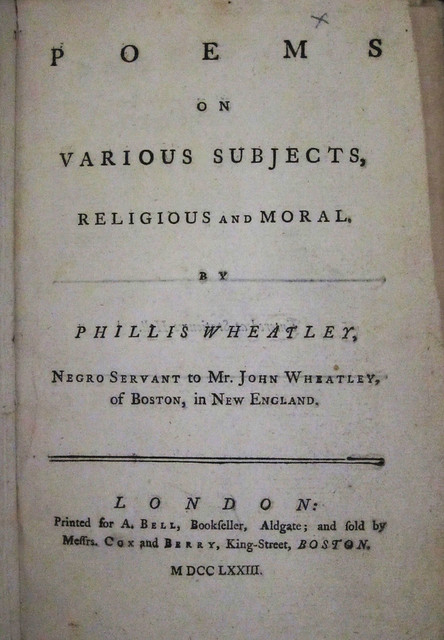
When Poems on Various Subjects appeared in September 1773, it was reviewed in at least eight London magazines. Reviewers invariably remarked on the unusual circumstance of an African slave writing serious literature, and several specifically pointed out the implications for the slavery debate. The Critical Review (September 1773) remarked that
The Negroes of Africa are generally treated as a dull, ignorant, and ignoble race of men, fit only to be slaves, and incapable of any considerable attainments in the liberal arts and sciences. A poet or a poetess amongst them, of any tolerable genius, would be a prodigy in literature.–Phillis Wheatley, the author of these poems, is that literary phaenomenon…. The author appears to be of a serious, and religious turn of mind.
Copies were sold in Boston too, and the book garnered as much attention and fueled as much debate in America as in England.
This historical context is important to an understanding of Wheatley’s poetry. In the 18th century, the highest form of artistic expression was poetry in the classical mode. Phillis’s formal language and classical allusions may sound stilted to modern readers, but it was vital that she prove her ability to write in this style. No one could argue that an author who could approximate the poetry of Homer and Ovid (or at least Milton and Pope) was possessed of a subhuman intellect.
Phillis’s religious sensibility is also an important aspect of the Poems. She was by all appearances genuinely devout in the Calvinist, evangelical Christianity of her Boston community. This too gave the lie to assertions that Africans lacked moral sensibility, and it lent support to evangelicals’ arguments that slaves should be taught to read the Bible and participate fully in religious life.
Most of Phillis Wheatley’s poetry cannot really be understood outside of its religious context. Particularly important is the Calvinist idea of Providence, and especially God’s ability to use even sinful acts of humans to achieve his purposes. The brief verse that Henry Louis Gates called “the most reviled poem in African American literature” depends entirely on this idea.
For the poet, an act of profound evil—her kidnapping from Africa—was used by God for a good end—her introduction to Christianity. An 18th century Congregationalist would understand that this in no way excuses the sinful act itself (although some proponents of slavery in the 19th century would use religious ends-justify-means arguments for continuing the slave system). And no one who has read Phillis Wheatley’s poetry and letters would believe that this is her intent, in this poem or in others on the subject.
The publication of Poems on Various Subjects may have been politically motivated, but the voice of the young poet also comes through strongly, despite what may seem to us an antiquated style and theology. Phillis Wheatley’s poems contain many conventional self-deprecating references to her lowly status, but in fact she had little hesitation in addressing the grandest personages, from King George to General Washington. In one poem she offers advice to the graduating class of Harvard:
Phillis’s independence of mind is also evident in the little we know about her later life. John Wheatley granted her freedom (perhaps under some pressure from her English supporters), and Susanna Wheatley died shortly after Phillis’s return from England in 1773. Phillis seems to have remained with John Wheatley and later with Mary and her husband during first years of the Revolution. But both John and Mary died in 1778, and Nathaniel had married and remained in England. Against the wishes of members of the extended Wheatley family, Phillis married a free black man, John Peters, in 1778.
Later biographers depicted Peters as a lazy con man, unworthy of the refined Phillis’s attentions. But this is probably unfair. In truth, Peters seems to have been intelligent, handsome, and ambitious. But the remaining Wheatleys disliked him, and Phillis seems to have had little contact with the family after her marriage.
John Peters advertised a planned second volume of Phillis’s poems in 1779, but it was never published. Peters, like many others, found himself in dire financial straits during the disastrous economic depression that followed the Revolution. He was likely interred in debtors’ prison more than once, leaving Phillis in difficult circumstances. The Peterses may have had as many as three children, but all apparently died in infancy.
Phillis, who had always suffered from respiratory ailments and an “asthmatic condition,” died in December 1784, probably while her husband was in prison. The manuscript of her second volume of poetry has never been found. We are left to remember this remarkable author only by her Poems on Various Subjects.
ZSR Library’s first edition of Poems on Various Subjects, Religious and Moral was purchased in 1994 with funds from the Oscar T. Smith endowment.
Selected sources
Vincent Carretta. Phillis Wheatley: Biography of a Genius in Bondage. Athens: University of Georgia Press, 2011.
Mukhtar Ali Isani. “The British Reception of Wheatley’s Poems on Various Subjects” The Journal of Negro History , Vol. 66, No. 2 (Summer, 1981), pp. 144-149.
Walt Nott. From “Uncultivated Barbarian” to “Poetical Genius”: The Public Presence of Phillis Wheatley”. MELUS , Vol. 18, No. 3, Poetry and Poetics (Autumn, 1993), pp. 21-32
Kirstin Wilcox. “The Body into Print: Marketing Phillis Wheatley.” American Literature , Vol. 71, No. 1 (Mar., 1999), pp. 1-29

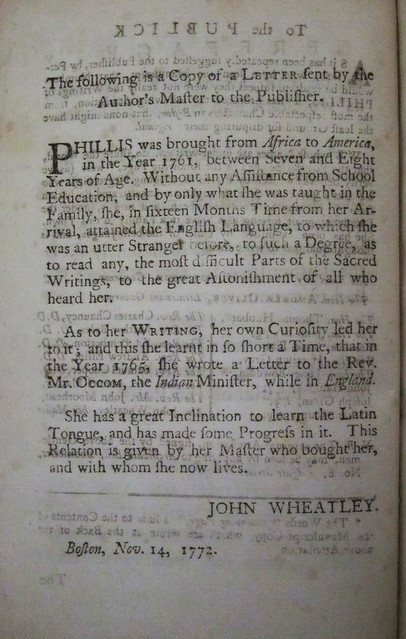
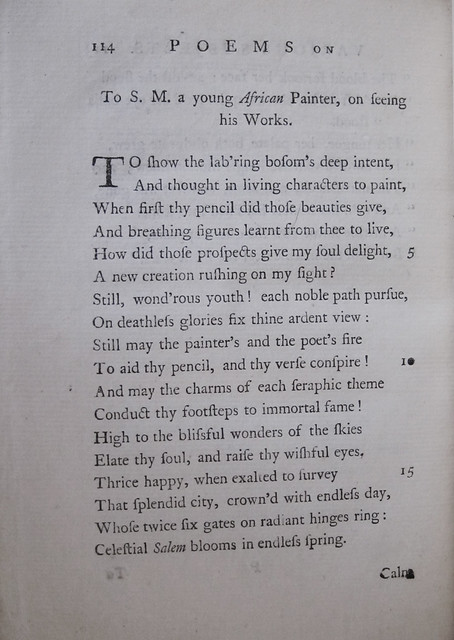
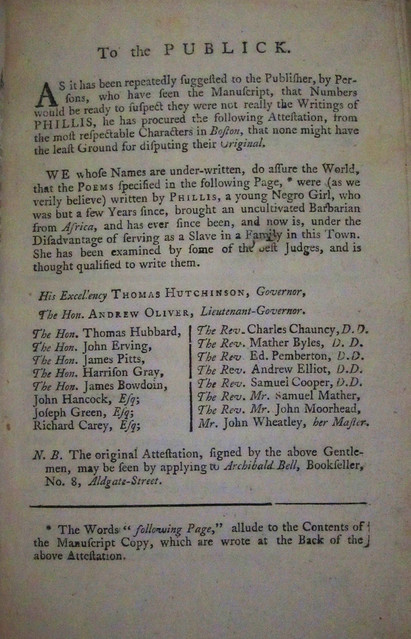
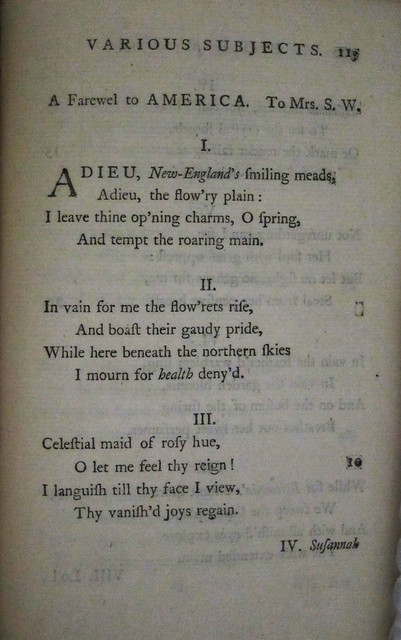
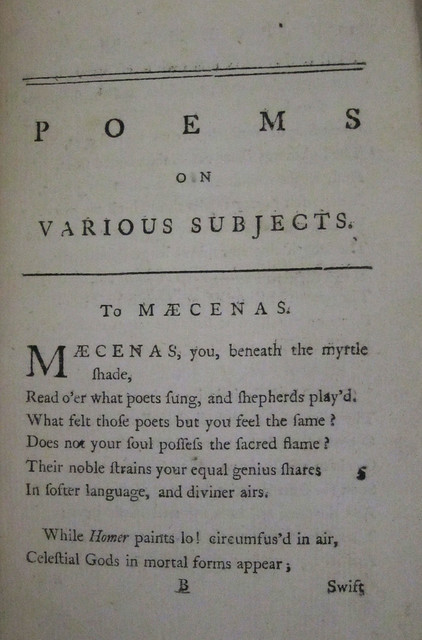
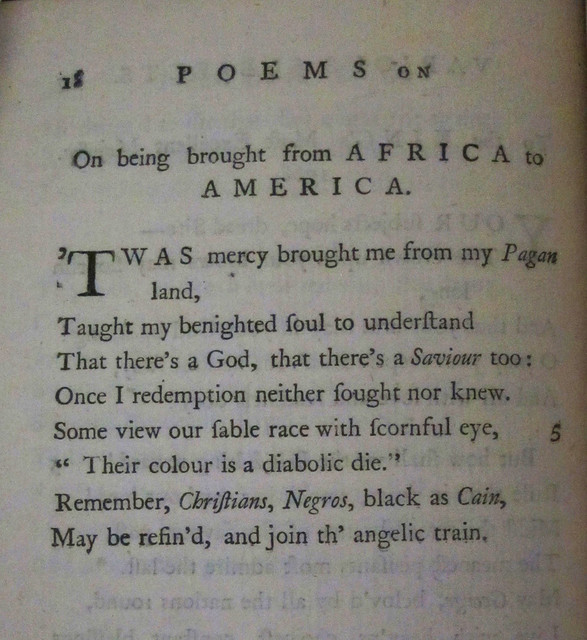
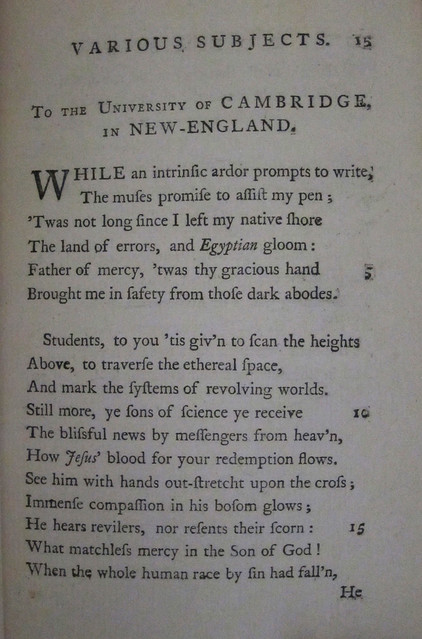
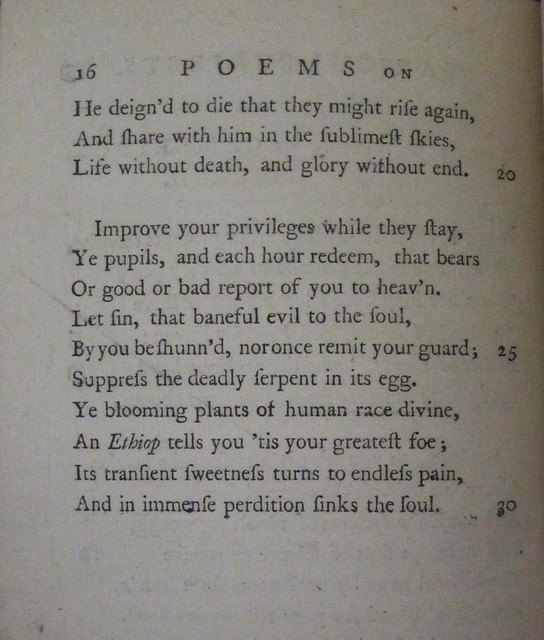
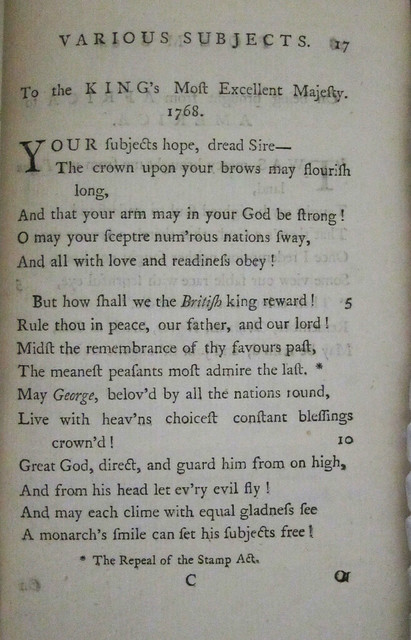
6 Comments on ‘Poems on Various Subjects, Religious and Moral, by Phillis Wheatley (1773)’
It is amazing how telling the history of a book and its author and reveal so much. Excellent.
A beautiful accounting of this work, Megan. I remember Sharon was very proud of the acquisition.
This is fascinating history, Megan. Thanks for investigating and sharing it.
I’m going to have to come to see the book. How exciting!
Wonderful RBOTM! After last month’s Pride and Prejudice, I couldn’t help to think of the patron Lady Catherine de Bourgh when you introduced Selina Hastings, the Countess of Huntingdon. We are all fortunate she was not as much of a snob!
Perhaps her manuscript for the second volume will be found one day…
Wonderful! Great job!